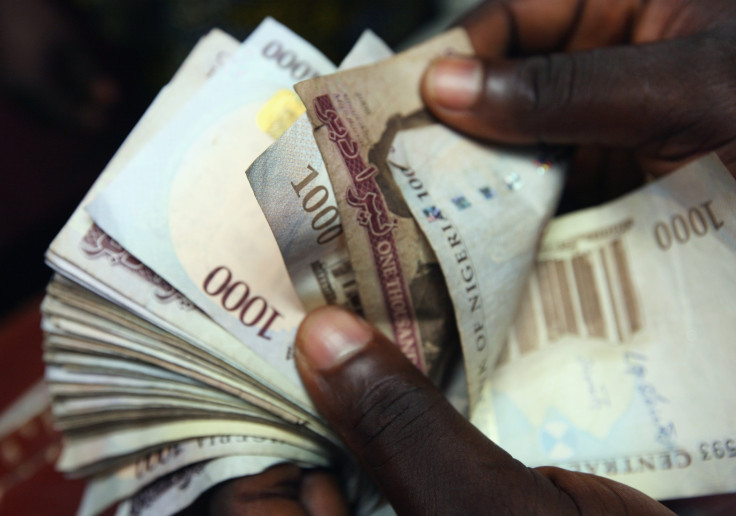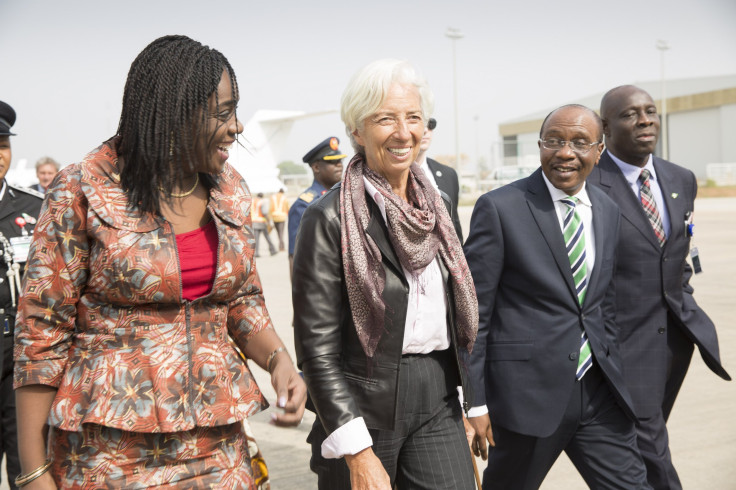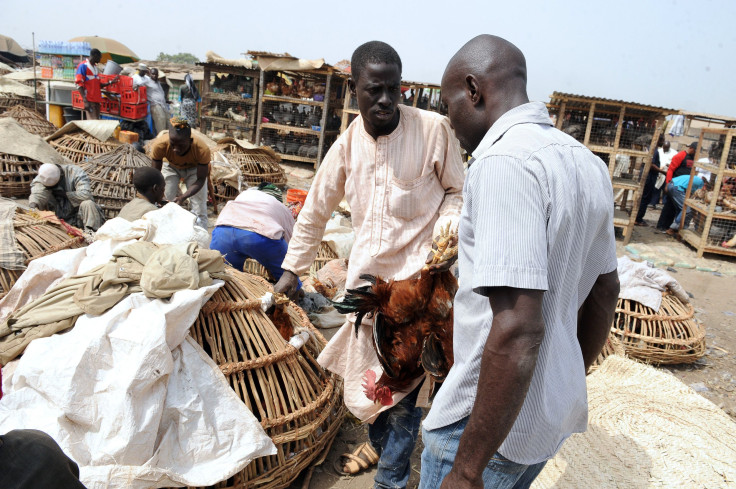Amid Low Oil Prices, Will Nigeria Devalue Naira Currency? IMF, Buhari Meet Over Economic Crisis

Record low oil prices continued to wrack Nigeria's sagging economy as President Muhammadu Buhari was holding talks Tuesday with the International Monetary Fund to discuss potential solutions. Ahead of the meetings, the managing director of the group that works to stabilize international currencies said she anticipated constructive discourse with the Nigerian leader, who was elected in March in part on his promises to revive Africa’s largest economy.
“I look forward to productive meetings with President Buhari and his colleagues as they address important economic challenges, most importantly the impact of low oil prices,” Christine Lagarde said in a statement Monday ahead of her trip from Washington, D.C., to Abuja, Nigeria's capital.
Lagarde's apparent optimism belies Buhari's resistance to IMF calls to devalue Nigeria's naira currency — a tactic that has helped other African nations cope with economic stress. Instead, the former military ruler has proposed a record budget for the 2016 fiscal year, while Nigeria's central bank has tried to prop up the failing naira to stem market panic. But economic analysts and policy experts predicted Buhari will eventually relent and allow the naira to weaken to absorb the impact of plunging oil prices and other external shocks to the economy before it can recover.
“We are expecting a devaluation of the naira. It’s a matter of when and it’s a matter of how it’s going to be devalued,” said Martina Bozadzhieva, head of research for Europe, Middle East and Africa at Frontier Strategy Group, a global research and advisory firm headquartered in Washington that specializes in doing business in emerging markets.
Nigeria, Africa’s biggest oil producer, is facing its worst financial crisis in years. The country has seen a continuous deceleration of economic growth since last year as global prices of oil, the country’s top source of state revenue, dropped a whopping 35 percent last year. GDP growth rate for Nigeria fell from 6.23 percent in the third quarter of 2014 to 2.35 percent in the second quarter of 2015. The country is also leading the regional fight against Islamic extremist group Boko Haram, which launched an insurgency in northeast Nigeria in 2009. The Monetary Policy Committee of the Central Bank of Nigeria warned in October that recession is imminent if proactive steps were not taken to revive growth in key economic sectors.

The naira has shed 25 percent of its value in the past year. The Central Bank of Nigeria last devalued the currency by 8 percent in November 2014 and fixed the official exchange rate at an even lower 198 to the dollar, although it sells at 222 at exchange bureaus. Rather than depreciate the naira again, the bank has restricted access to foreign currency and banned a long list of imports, a move that IMF Africa director Antoinette Sayeh called “quite detrimental.”
“Those restrictions on those products are already making it harder for the average person to buy milk or to buy milk at an affordable price,” Sayeh said at the IMF annual meeting in Peru in October, according to the Associated Press. She urged a review of the restrictions and for officials to “permit the exchange rate to continue to adjust.”
Nigeria is a food-deficit nation and depends on imports of grains, livestock products and fish as well as refined petroleum. Devaluing the naira would mean that Nigerian importers would buy the goods in U.S. dollars, for instance, and sell in naira, so they either get less for their money or have to charge consumers more. But there’s a flip side. If its currency is depreciated, Nigeria would earn more naira for its exports, like oil, which would allow for greater flexibility to fund big spending increases. The Nigerian economy might also come out more resilient after letting the naira fall and endure the global market turbulence, according to economic and policy experts.
Last month, Buhari asked lawmakers to approve Nigeria’s biggest budget yet, to the tune of 6.08 trillion naira (about $30.1 billion) for the 2016 fiscal year. The deficit would more than double to 2.2 trillion naira, or 2.16 percent of GDP, and capital expenditure would more than triple to 1.8 trillion naira in 2016. But the proposed budget took into account the low oil prices and the bulk of the funds would be spent on much-needed infrastructure projects, which signals that Buhari’s administration is aware of the current challenges.
“They can’t avoid the pain,” Bozadzhieva said. “The pain is going to happen; it’s going to affect consumers and that’s why you see a big increase in government spending in order to compensate for that weakness.”
Still, the Nigerian government hasn’t budged on its stance against currency depreciation. The Central Bank of Nigeria governor, Godwin Emefiele, said in October the bank would not devalue the naira anytime soon. Buhari restated that position during his first presidential media chat last week, saying import-dependent Nigeria cannot afford to depreciate its currency. “I will not support devaluation,” he said on Dec. 30. “I need to be convinced that devaluation of the naira is what Nigeria needs.”
“It seems that some kind of adjustment is more or less inevitable. I think there would be minimum fanfare about it. But Buhari does have a point,” said John Campbell, the Ralph Bunche senior fellow for Africa policy studies at the Council on Foreign Relations, a nonprofit think tank in New York City.

Choosing to not devalue the naira would lead to severe foreign exchange shortages that make it much harder to import goods into Nigeria and significantly reduce foreign investment, along with a surge in black market exchange rates. It could also require further bans on importing certain products beyond what the central bank has already imposed, which would hurt the business sector.
Economic analysts and policy experts agreed that Buhari’s administration will remain opaque on devaluing the naira until they make a decision to avoid a run on the currency. The problem with waiting too long is Buhari might be forced to devalue it overnight rather than gradually, which would undermine investor confidence in the government.
“We may get some sense of how they feel about these options following their meetings with the IMF. They are much more likely to try to do it gradually,” Bozadzhieva said. “Literally until the night that there’s a devaluation, they will deny that there’s going to be one.”
The IMF, a Washington-based organization of 188 countries, has helped out a number of African nations in difficult times. The IMF approved a $918 million bailout package for Ghana in April to restore debt sustainability and macroeconomic stability, as oil revenues were cut in half and the cedi currency shed 22 percent. The fund is set to review Ghana’s performance under the three-year austerity program on Jan. 13. Economic and policy experts said following the IMF's advice can help boost investor confidence and shows the government is willing to take the necessary steps, no matter how difficult.
But the IMF hasn’t always been a beacon of support in Africa. The fund backed a structural adjustment program in Nigeria in the 1980s, which failed to address a number of economic problems. Instead, external debt swelled, the fiscal gap widened and economic growth became far-fetched.
“The financial advice, in hindsight, hasn’t always been the best with respect to Nigeria,” Campbell said. “Buhari remembers those days very well. He’s going to be looking out for Nigeria’s interest and he’ll be weighing very carefully the advice he’s given.”
© Copyright IBTimes 2024. All rights reserved.





















